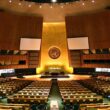Every Khalifah has advanced the cause of Islam exactly the way the Promised Messiah (as) described. When people object to Khilafat they forget to ask themselves: What alternative is there?
After the demise of the Promised Messiahas his community of followers agreed upon the person of Hazrat Hakeem Molvi Nooruddinra to become the first Khalifatul-Masih. However, there was a group of people who believed that an Anjuman (the administrative body of the Community) was the true successor to the Promised Messiahas and that the role of the Khalifah was only ceremonial. This group, which later broke-off from the Community and founded the Anjuman Isha’at-e-Islam, was unable to openly propagate its views during the Khilafat of Hazrat Khalifatul-Masih Ira. However, upon the demise of Hazrat Khalifatul-Masih Ira and subsequent elevation of Hazrat Mirza Bashiruddin Mahmood Ahmadra to the station of Khilafat, they began to speak out against the Khalifah.
This group which comprised of individuals like Khwaja Kamaluddin and Molvi Muhammad Ali believed that the Anjuman should be given authority in matters pertaining to all major decisions of the Community; the Anjuman should be head of the Community. They cited sayings of the Promised Messiahas in support of their claim and began to publish a periodical by the name of Paigham-e-Sulh [Message of Peace] to further their cause.
However, what they failed to understand was that the Promised Messiahas had clearly envisioned the institute of Khilafat to continue his mission after his demise. What people fail to understand, especially those who object to Khilafat, is that it is the living signs of God that are manifested through Khilafat which keep the religion of Islam alive; without someone who is divinely appointed and guided, this cannot occur.
The mention of Khilafat in Al-Wassiyyat
The Promised Messiahas wrote the well-known book Al-Wassiyyat [The Will] in 1905 and informed his Community that, based on revelations he was receiving from God Almighty, his demise was near. Naturally the question of what would happen after his demise was addressed by the Promised Messiahas. We find in Al-Wassiyyat a very clear and manifest desire of the Promised Messiahas for the Community to witness “the second manifestation of God’s Power”; in other words Khilafat. The Promised Messiahas cites the example of sad demise of the Holy Prophet Muhammadsa and how the Muslim Community was brought together through the person of Hazrat Abu Bakrra. He also gives the example of Khilafat being established after Prophet Mosesas to give his Community hope, as if to say that do not worry, for after me there will be continue to be people who will be guided by God, who shall lead you. After giving such examples the Promised Messiahas states:
“So dear friends! Since it is the practice of Allah, from time immemorial, that God Almighty shows two Manifestations so that the two false joys of the opponents be put to an end, it is not possible now that God should relinquish His practice of old. So do not grieve over what I have said to you; nor should your hearts be distressed. For it is essential for you to witness the second Manifestation also, and its Coming is better for you because it is everlasting the continuity of which will not end till the Day of Judgement.” [1]
The future of Islam in Victory of Islam
When the Promised Messiahas published Fate-Islam [Victory of Islam] in 1891, which towards the beginning of the establishing of the Ahmadiyya Muslim Community, he laid out how the task of the reformation of mankind would continue. He outlined five branches which are:
- The publication of books—the likes which the Promised Messiahas wrote.
- The publication of announcements to call the masses towards Islam.
- Hospitality of those guests who come to learn about the Community.
- Letters which are written in reply to members of the Community or opponents.
- The members of the Community who enter his Baia’at [pledge of allegiance].
After explaining these in detail the Promised Messiahas makes a profound statement about the future of Islam. He writes:
“Some say that establishing Anjumans and inaugurating schools is sufficient in helping the religion [of Islam]. However, such people do not understand what is meant by religion and what is the ultimate purpose of our being, and in what manner and in what ways such objectives can be achieved. They ought to know that the ultimate purpose of this life is to attain such a true and certain connection with God Almighty which frees one from the baser self and takes him to the fountain of salvation. The paths to this perfect certainty cannot be unearthed by human enterprise and efforts and a philosophy concocted by man cannot benefit anyone in such endeavour. Rather God Almighty makes this light descend from heaven through his special men at a time of darkness; only he who descends from heaven can take one to heaven.”[2]
In very clear words, the Promised Messiahas explains that the future of Islam is certainly not in organisations, rather Islam needs people who are guided by God. In other words, the Promised Messiahas desired for Khilafat—which not only is bestowed by God Almighty but is sustained by Him too—to continue after him.
The Prophecies of Hazrat Musleh Maudra
The Promised Messiahas in many places has indicated that the Musleh Maudra would be his successor. If a Musleh was to be the Promised Messiah’s successor, then naturally it meant that the Founder of the Community thought that Khilafat would be established after him. Of course, the Promised Messiahas did not claim that it was Hazrat Mirza Bashiruddin Mahmood Ahmadra who was the fulfilment of the prophecy of Musleh Maud, rather he left it up to the Musleh Maud to advance such a claim in his own time. However, what is undeniable is that the Promised Messiahas believed that the Musleh Maud would indeed be a Khalifah. In one place alluding to the manifestation of the “second grace” which is Khilafat, the Promised Messiahas writes:
“In order to manifest the second method for bestowing His grace, God will send the second Bashir, as prophesied in the announcement of 10 July 1888, issued prior to the death of the first Bashir, in which God revealed to me that He will give me another Bashir who will be called Mahmood and will possess great resolve”[3]
These are just a few examples that prove that the Promised Messiahas intended for Khilafat to continue after him, for it is only through Khilafat that the Community could receive Divine guidance which was, according the Promised Messiahas, the cornerstone of the reformation of mankind.
The Era of the Fifth Khilafat: Hazrat Mirza Masroor Ahmad, Khalifatul-Masih Vaba
The history of the Ahmadiyya Muslim Community is proof that every Khalifah has been divinely guided. The Community has faced all manner of persecution, opposition, enmity and outright hatred—had this been a human endeavour, it would not have succeeded. However, we find that not only is the Community growing in number but is also being strengthened under Khilafat.
When we reflect upon the world around us; all of it’s problems and crisis we find Hazrat Mirza Masroor Ahmad, Khalifatul-Masih V to be a beacon of hope. The whole point of a Khalifah is that the community of Muslims become collected under a single banner; there is no discord, there is no difference of opinion which can cause rifts, there is no theological conflict. Rather, there is unity, there is peace, harmony and most importantly, there is a someone (who is divinely guided) to lead.
When people object to Khilafat they often forget to ask themselves: what alternative is there? If a group of scholars lead a community they can only lean on their knowledge and their own discernment. Khilafat has not existed in the Muslim Ummah for nearly 13 centuries, during this time were scholars able to save the Muslims from sectarianism? Therefore, when we have been blessed with Khilafat, it becomes the responsibility of Muslims to become collected under his banner—more importantly, those that have already accepted him to progress their relationship with him and increase in loyalty and obedience.
The Fifth Khilafat has seen the propagation of Islam take on new forms and accelerate to a speed that is unmatched. Would this, could this, have occurred without Khilafat? If it could, then which organisation can be cited as an example?
[1] Al-Wasiyyat [The Will], English translation, pg. 7.
[2] Fate-Islam, Ruhani Khazain Volume 3, pg. 41-42.
[3] The Green Announcement, pg 17.









